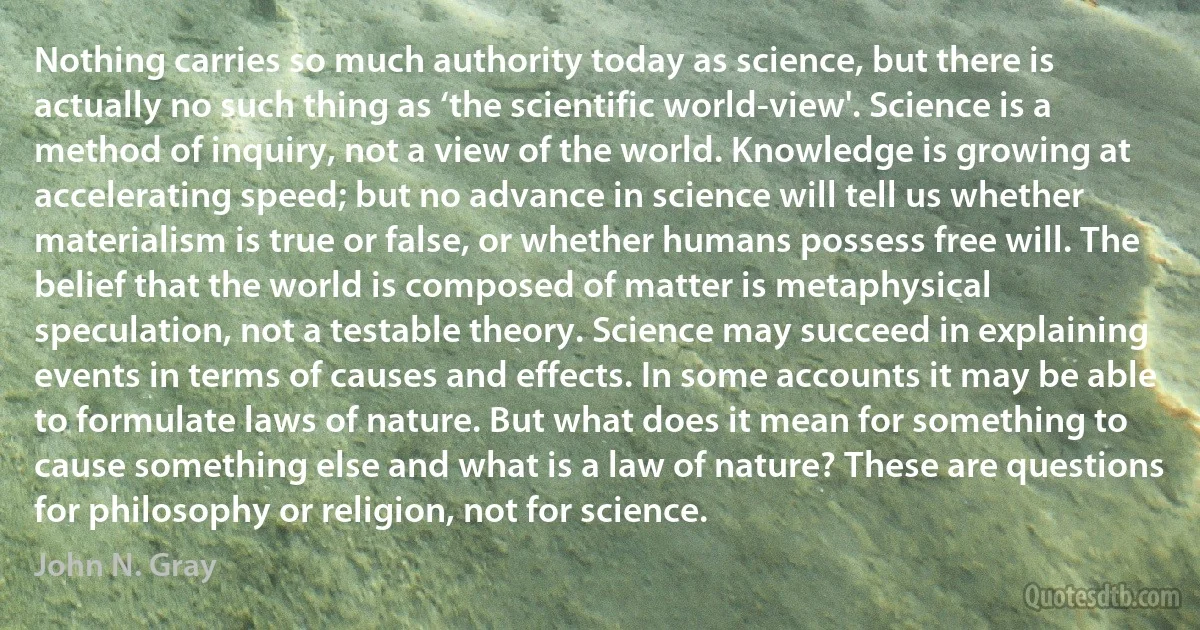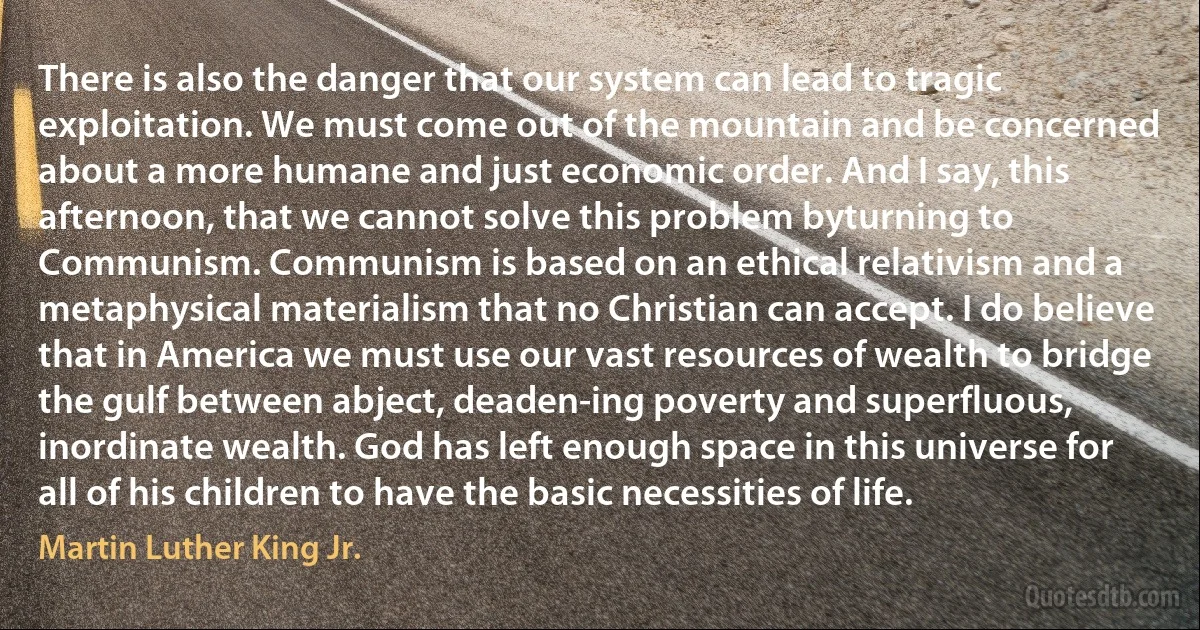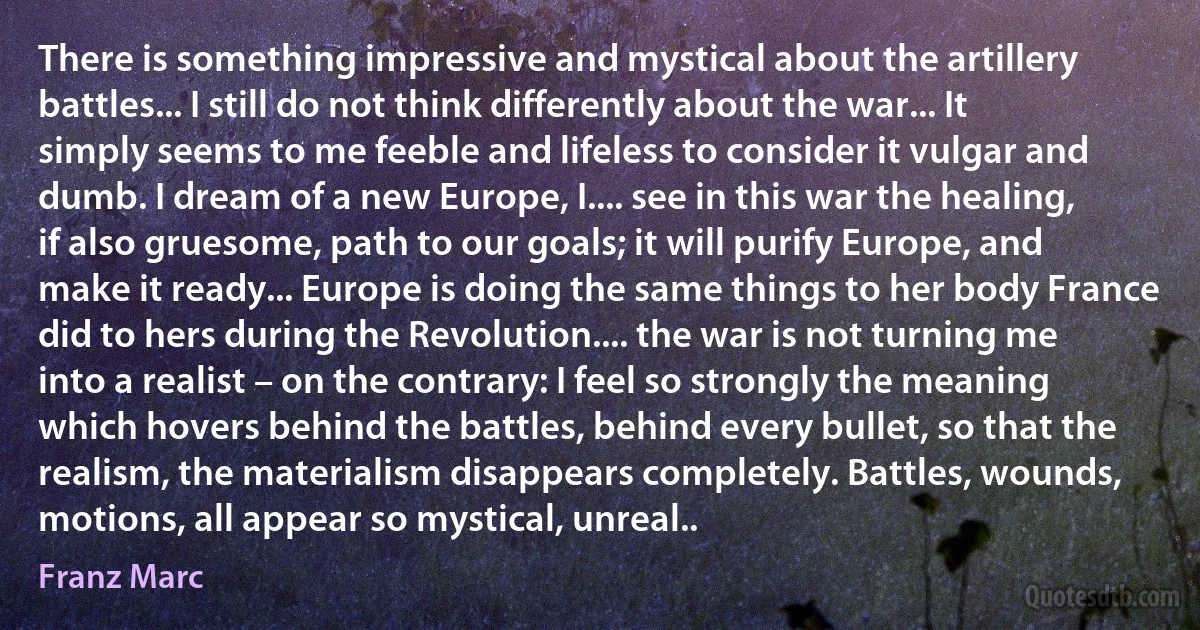Materialism Quotes - page 4
Do you understand now the relationship between the question of spontaneous generation and the major problems that I listed in the beginning? But, gentlemen, in such a subject, rather than as poetry, pretty fancy and instinctive solutions, it is time for science, the true method resumes its duties and exercise. Here, it takes no religion, no philosophy, no atheism, no materialism, no spiritualism. I might even add: as a scholar, I do not mind. It is a matter of fact; I approached without a preconceived idea, too ready to declare, if the experiment had imposed upon me the confession, that there was a spontaneous generation, of which I am convinced today that those who assure it are blindfolded.

Louis Pasteur
Man is by nature a pragmatic materialist, a mechanic, a lover of gadgets and gadgetry; and these are the qualities that characterize the "establishment" which regulates modern society: pragmatism, materialism, mechanization, and gadgetry. Woman, on the other hand, is a practical idealist, a humanitarian with a strong sense of noblesse oblige, an altruist rather than a capitalist.

Elizabeth Gould Davis
Outside the academic establishment, the "far-reaching change in all our habits of thought” is more serious. It serves to coordinate ideas and goals with those exacted by the prevailing system, to enclose them in the system, and to repel those which are irreconcilable with the system. The reign of such a one-dimensional reality does not mean that materialism rules, and that the spiritual, metaphysical, and bohemian occupations are petering out. On the contrary, there is a great deal of "Worship together this week,” "Why not try God,” Zen, existentialism, and beat ways of life, etc. But such modes of protest and transcendence are no longer contradictory to the status quo and no longer negative. They are rather the ceremonial part of practical behaviorism, its harmless negation, and are quickly digested by the status quo as part of its healthy diet.

Herbert Marcuse
[ Gustav Fechner ] was troubled by materialism... His philosophical solution of the spiritual problem lat in his affirmation of the identity of the mind and matter and in his assurance that the entire universe can be regarded as readily from the point of view of its consciousness... as it can be viewed as inert matter.

Edwin Boring
If we understand our own times, we will know that we should affirm the reality of God by challenging the domination of materialism and naturalism in the world of the mind. With the assistance of many friends I have developed a strategy for doing this. ... We call our strategy the "wedge."

Phillip E. Johnson
The various philosophies of life presented themselves as a conquest of materialism, or in any case, they readily claimed it. That does not change anything: their valuations, revaluations, and explanations of disvalue have been emptied into the over-all secularization stream, where they have only hastened the tendency to unlearn, which is a neutralizing process, after all.

Carl Schmitt
There is nothing more deplorable than those skeptics and reformers, liberal priests and humanistically-oriented scholars, who moan about "soullessness,” "barren materialism,” what is "unsatisfying in mere science,” and the "cold play of atoms,” and renounce intellectual precision, which is for them only a slight temptation. Then, with the help of some alleged "emotional knowledge” to satisfy the feelings, and with the "necessary” harmony and rounding-out of the world picture, all they invent is some universal spirit: a world-soul, or a God, who is nothing more than the world of the academic petite bourgeoisie which gives rise to him; at best, an oversoul who reads the newspaper and demonstrates a certain appreciation of social questions.

Robert Musil
Feuerbach is the only one who has a serious, critical attitude to the Hegelian dialectic and who has made genuine discoveries in this field. He is in fact the true conqueror of the old philosophy. The extent of his achievement, and the unpretentious simplicity with which he, Feuerbach, gives it to the world, stand in striking contrast to the opposite attitude (of the others). Feuerbach's great achievement is: (1) The proof that philosophy is nothing else but religion rendered into thought and expounded by thought, i.e., another form and manner of existence of the estrangement of the essence of man; hence equally to be condemned;(2) The establishment of true materialism and of real science, by making the social relationship of "man to man” the basic principle of the theory; (3) His opposing of the negation of the negation, which claims to be the absolute positive, the self-supporting positive, positively based on itself.

Karl Marx
I wonder how long this word will last, governed exclusively by the merciless, inhuman and immoral criteria of global economy. Seeing the shadow of distant islands, I imagined one still inhabited by a tribe of poets set aside for when, after the middle age of materialism, humanity will have to start to put other values into his existence.

Tiziano Terzani
Why doesn't all this information-processing go on "in the dark", free of any inner feel? ...We know that conscious experience does arise when these functions are performed, but the very fact that it arises is the central mystery. There is an explanatory gap [a term due to J. Levine, "Materialism and qualia: The explanatory gap" Pacific Philosophical Quarterly 64:354-61, 1983] between the functions and experience, and we need an explanatory bridge to cross it.

David Chalmers
There were the Chârvâkas, who preached horrible things, the most rank, undisguised materialism, such as in the nineteenth century they dare not openly preach. These Charvakas were allowed to preach from temple to temple, and city to city, that religion was all nonsense, that it was priestcraft, that the Vedas were the words and writings of fools, rogues, and demons, and that there was neither God nor an eternal soul. If there was a soul, why did it not come back after death drawn by the love of wife and child. Their idea was that if there was a soul it must still love after death, and want good things to eat and nice dress. Yet no one hurt these Charvakas.

Charvaka
Why and how did our country fall from its brilliant antiquity to the degradation of pre-British days? The answer is that defeat of the oppressed castes at the hands of the Brahminic overlordship, of materialism by idealism, constituted the beginning of the fall of India's civilization and culture which in the end led to the loss of national independence.

E. M. S. Namboodiripad



